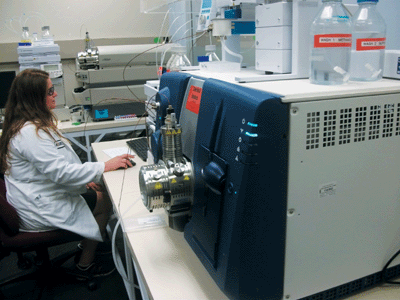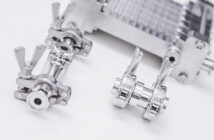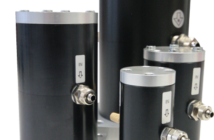The acquisition of a new testing machine enhances Hill Laboratories’ ability to monitor pesticide and containment residues on food.
The recent purchase of a $650,000 Applied Bio systems LCMS/MS (liquid chromatograph mass spectrometry/mass spectrometry) machine, imported from the USA, will provide increased specificity and sensitivity in the detection of pesticides. As only the third such machine in use in New Zealand, Hill Labs will use it to analyse extremely minute traces of pesticides and contaminants in a wide range of foods.
According to Colin Malcolm, senior client service manager for Hill Laboratories, consumers are more concerned than ever before about what they are eating. This includes wanting surety that food is free of chemicals and is safe for consumption.
Hills’ new LCMS/MS machine offers the ability to provide that surety of food safety more than any other testing device or method available.
The machine, along with other specialist equipment, measures pesticide levels in food samples. It has the ability to analyse for 200 different types of pesticides down to 7.5 parts per trillion from one test tube. Hill Laboratories is able to perform thousands of tests a year because each test takes less than 10 minutes to complete.
A significant investment for Hill Laboratories, the machine offers a unique opportunity to detect today’s more environmentally friendly – but harder to detect – pesticides. Chemicals used in today’s pesticides are produced with large molecules, rather than small. This enables a pesticide, for instance, to target specific bugs – rather than killing all bugs in its path. Less than a decade ago, pesticides were made with smaller molecules that only allowed for non-specific pest eradication.
“It is all about more specific detection for a new generation of chemicals,” says Mr Malcolm. “This machine allows Hills to offer a more comprehensive suite of multi-residue screens for our customers. It allows for more chemicals to be screened with less analysis, as hundreds of chemicals can be tested for in one injection. That means we can offer greater value for less cost.”
Hill Laboratories has continued to grow its food testing to accommodate not only the changes in pesticides, but also the extremely varied New Zealand food industry.
By adapting over the years to test a huge range of foods grown throughout New Zealand, Hill Labs has become known in the industry as a true international player.
The company’s expertise and ability to adapt its testing methods to this large variety of foods is what allowed them to start testing from Japan over 10 years ago. The company has also become the lab of choice for many growers in the US and Australia, who regularly send food samples to New Zealand for testing. Additionally, Hills is now operating in China.
According to Mr Malcolm, there is no other lab in Australasia that can do the range of food testing that Hill Labs can do. The new LCMS/MS machine at Hill Labs will ensure that their pesticide safety system is able to continue to detect newly developed pesticides with confidence.
“We remain ahead of other labs because we have a culture of looking overseas to find the latest, best technologies and bringing them back to New Zealand so we can expand our testing facilities for our clients,” says Mr Malcolm. “This culture of remaining at the ‘cutting edge’ makes our scientists some of the best in the Australasian region. That’s why we have customers in the US and Asia Pacific region all sending their food samples here to Hill Labs in Hamilton for testing.”





























































































